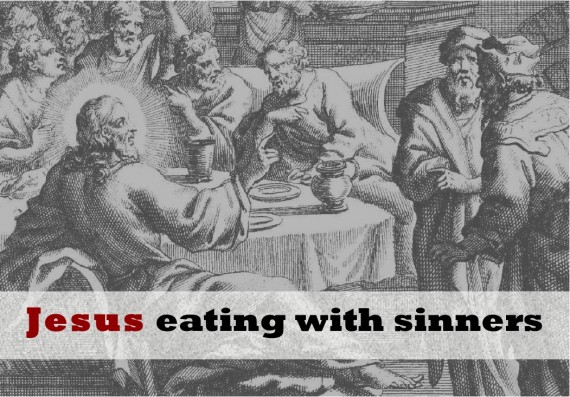 One of the primary reasons churches create doctrinal statements and other boundaries so so they can better protect the members against heresy and false teaching. Churches feel they need to separate the wheat from the chaff, the sheep from the wolves, the sound teacher from the false teacher, the orthodox from the heretic, and the righteous from the wicked.
One of the primary reasons churches create doctrinal statements and other boundaries so so they can better protect the members against heresy and false teaching. Churches feel they need to separate the wheat from the chaff, the sheep from the wolves, the sound teacher from the false teacher, the orthodox from the heretic, and the righteous from the wicked.
I understand the concern, and believe it is a real tragedy when people hear and believe things that are false. This concern drives me to read and write and study as I do.
But there are numerous problems with thinking that doctrinal statements and membership classes can keep false teaching out of the church. I will deal with one of them here, and others in subsequent posts.
Separating Wheat and Chaff is not Our Job
I hate to sound like a union member, but the first reason we should not attempt to separate the wheat from the chaff is because it is not our job. Judging others is the task of Jesus, and when we try to take this responsibility upon ourselves, we are practicing a form of idolatry by putting ourselves in the place of Jesus. Besides, we are notoriously bad judges.
Jesus knows this, which is why He says to just let the wheat and the tares grow together, and let Him sort it all out when He comes (Matt 13:29-30).
We inevitably weed out the wrong people, keeping those who have the money and the power while rejecting those who are humble and poor. Or we get impatient with the slow growth of some and think that if we “thin” the crowd a bit, we can give more water and nutrients to those who look more promising. But Jesus does not judge by outward appearances, and He often chooses the shameful, the lowly, and the foolish—the very same people we would reject.

Jesus Welcomes those We Usually Reject
In the Gospels, the people who Jesus keeps around Him are typically the people we reject—the sinners, the prostitutes, the tax-collectors, the poor, the traitors, and the anti-government zealots. The people we tend to keep around are the people who couldn’t stand to hang out with Jesus—the religious and political elites, the rich, the famous, the well-known and well-off. Jesus would have accepted them the way He accepts everybody, but this second group didn’t like it that Jesus also accepted the first group, and so they chose not to stick close to him.
Notice that regarding the religious and political elites, Jesus did not put up a boundary or create a wall which kept them away. He welcomed and accepted them just like everyone else. But it was exactly this wide-open welcome policy of Jesus which turned the elites away. They wanted to maintain their privileged status, which is something Jesus would not grant. And so they kept their distance from Jesus, which is what many of us still do today.




Well said Jeremy! We do a lousy job of trying to “separate the wheat from the chaff”. We may think we know someone, but only Jesus knows their heart. I knew a man (now deceased) who was a pastor until he retired. He always said and did all the right stuff, but after retiring admitted that he had never believed any of it. He said it was “just a job”.
We have a family member who was trying to follow Jesus. The church announced that they needed more people in the choir. He volunteered. The pastor took him aside and told him he could not be in the choir because he was not a Christian because he smoked. He was shocked that the pastor would tell him that. That was almost forty years ago, and our family member and his wife have stayed away from the church and Jesus since that day.
We may think that people like that pastor have good intentions, but we really don’t know that either do we?
Only Jesus knows our hearts. He’s the one to separate the wheat from the chaff, the sheep from the goats. As Katherine Gunn said on another blog, if we try it, we may end up with a church full of goats!
A church full of goats! What a picture!
But you are right. We cannot really tell.
I know a pastor right now who has blatantly told me on numerous occasions that the only reason he is a pastor is because he has no other skills, and could not make as money as he is now in the pastorate. He doesn’t believe a bit of what he does or says, but it is all “part of the job.”
I wonder how common this is?
I think we know the same person! However I do not want to know if my mentor feels that way. I haven’t spoken to him since I left the institution, nor has he tried to contact me. (It’s hard running a 2,000 member church)
Many people I knew on the “inside” won’t even friend me on Facebook. It’s like they’re angry with me or they still think I’m possessed. 😉
Man, I have run into the same thing. I’ve even had people turn around a walk the other way when they see me in the store.
I have moments when I think it would be simpler…
But I wouldn’t trade the freedom I have gained for that false sense of security – I have a handful of friends who believe in Jesus and seem to like me – even value me (a new concept for me). And I have one close, dear friend – we have stood with each other…
And after all, what can I expect when, as a church leader, I quit and tell the pastor I can’t stay and listen to him preach because it makes me want to throw up – and refuse to preserve the image of the church by lying to protect a sexual predator in the pulpit. That is the kind of behavior that will get you shunned for sure. 🙂
That really stinks…I sometimes want to be ignorant of everything, and become a pew warmer..I really do.
Jesus is teaching about Kingdom of God not the church. Read the parable carefully. Read the Greek text too so that we will not misinterpret Biblical message.
Amen!
Seek first the Kingdom of God and His Righteousness !
So agreed..how often we judge a book by its cover…how often we tell off a person just by the way he or she dresses and etc but fail to look past that..
Angela,
Yes, we always look at the the outward appearance, and make judgments about the spiritual.
@Katherine Gunn: WordPress won’t let me nest more than one comment. Your blog is bookmarked 🙂
Thanks. 🙂
Hope you like…
I know the feeling, control, manipulation, accusations, threats, innuendo, sidelined, gossip, devalued, these and other methods are used to isolate those who are seen not to be a yes person. The accusation of not being a team player is used, that can only apply if there is a team spirit at work to start with.
Will the Church never learn.
I remember the Senior pastor at a church I worked at. There was a young man who loved the lord and wanted to go to bible school, but the Sr Pastor had a favorite, but this fellow had no interest. He was not a “learner”, not into reading and was a rather new Christian but he pushed him to Bible Schol and got him a scholarship (he knew loads of people). But the kid who would have excelled, was a fantastic student, and probably knew more about the Bible than the Sr pastor was sidelined. He wasn’t the pastor’s favorite. So he had to pay for everything himself. The unfavorite was a Christian all his life and had the makings for a missionary, while the favorite didn’t have potential for much. But when he finally graduated bible school, he was given a small church to run and eventually quit after 4 months. He was also the youth pastor at the church. But the pastor used him as another one of his “successes”. He made 5 pastors! What a claim! While the other kid was left hanging,was not allowed to run ANY ministry, and was never “pushed” into the pastor’s circles. I felt for him because what happened to him happened to me! I was not a favorite, because I wasn’t a Yes man, and I had other skills that I think a lot of them felt jealous of.
Yeah, the is a familiar story. I was not the ‘favorite’, either…
But Jesus loves you, and He’s lifted you up. Remember that. 🙂
:*) Thank you for the reminder.
I agree it is not our job but the quote in the bible is meant as a warning that Jesus WILL separate the wheat from the chaff and that it is important to accept his gift of salvation. It should also be noted that though he sat down with sinners he did so in an effort to expose them to salvation also. When he met the prostitute at the well he didn’t say; “because you have listened to me you will receive eternal life, he said “go, and sin no more.”
this is not true, we are told to judge righteously and God judges unbelievers but we are to judge believers, sin must be taken out of the church, read your bible again, what happened with the man that was fornicating with his mother in law, didnt Paul judge him, didnt he say for the church to judge him and put him away from the church, remove him? A pastor must not allow sin his church, thier are instructions to warn a sinner in front of the whole congregation. This is wrong, this is so we keep quiet and let false doctrine and sin fester in our midst.
Antoinette,
I understand the biblical words “judge” and “church” quite differently than you, as well as the role of the pastor. It is impossible to not allow sin into the church, and if any pastor tries, he better get rid of himself first. Your line of thinking leads down a very dangerous and hopeless road.
The Bible makes a distinction between those who sin habitually on a daily basis and those who “stumble” (James 3:2). The modern nonsense that all Christians are “sinners” is not Biblical at all. There are countless verses that reveal God hates sinners, those who sin daily and have made peace with their sins.
Have you not read Romans 5:8?
“… while we were ‘yet’ sinners, Christ died for us.”
Clearly the Bible teaches that Christians are no longer sinners once they have given their life to Christ and begun following His ways. Yes, they still stumble, but that is not at all the same as ‘being’ a sinner. To claim that it’s impossible to keep sin out of the church is absolute nonsense.
As much as Jesus went out amongst the lowly who were in need of God, it is God who set the Isrealites apart from all others. Personal boundaries are what define your identity. They’re like the property lines around a home. This is my property and that is not my property. This is me (my personality — what I value, am good at, believe, need, or feel — and that other is not me. The word “holy” was to show that followers of God were “set apart” (sacred, consecrated, venerated) from other people who were not God’s followers. God clearly has boundaries and tells us what are abominations to him. Doors keep out those who aren’t living life with the principles of God….. and God is very clear that he “rejects those who reject what he has given them”. Yes, the Isrealites are “God’s chosen” — and God is also using the gentiles who can out amongst those who need to hear — who need God’s help, his food — and we can do that because we are God’s ambassador’s here on earth— but we must also be “watchful” because there are those who will not come to him, seek him or repent of their wickedness, so we are to be “discerning” and not to associate with such wickedness.
Proverbs 17:9 ESV —- Whoever covers an offense seeks love, but he who repeats a matter separates close friends. (John 10:10) The thief comes only to steal and kill and destroy; I have come that they may have life, and have it to the full.
Amen, Lorean.
The KJV intro to 2 John supports your point with its warning against ‘undiscerning love’ and how dangerous it declares it to be in this world.
“… love must be discerning, It is not a naive, unthinking, open to anything and anyone kind of love.”, “… it is dangerous and foolish to float through life with undiscerning love.”
There are a great many false prophets at the head of church these days, so it makes choosing a church a very difficult thing. I also know many people put to much faith into their very human pastor, and seem to forget he is NOT the holy one. Rather he is a man, who tries and interprets the bible, in order to educate his flock about our Lord, and Jesus.
After reading your response regarding the less desirable types, I seem drawn to them, and have a great sympathy for them, and am often ridiculed because I feel these people are just as special as everyone else. People should never forget God loves them just as much as he loves everyone else.
Wonderful! Jesus also was drawn to these “least desirable types.” If you are drawn to them as well, then I firmly believe you are following Jesus. Keep following Him and see where He leads!
Not really. The Pharisees, Sadducees and scribes were the least desirable types of Jesus’ day and He ‘HATED’ them. He publicly humiliated them every single chance He got and not once did He attempt to convert them.
He even explained that He was teaching His disciples in parables once so that the specific crowd of these people who were present would not hear and understand His teaching because, He said, then they would repent and He would have to forgive and save them.
(Matt. 13:13-15)
There were only a couple that “came to Jesus” in sincerity and He dealt with them accordingly.
(John 6:44)
The scriptures demonstrate that the chiefest of apostles were quick to repent with error (Acts 23:5 Gal 2:14) even when the rebuke came from the wicked. Why then is it so hard and almost never coming for those who sit in a hierarchy that Jesus never established (Luke 22:24-26) and who also set up “litmus tests” for excommunicating “heretics” (subtly administered in the following way”…maybe it would be better if you would find yourself a church that believes more like you do…”) to repent and change the order of their churches?
Here we are, so many years later. The turning of values on heads has arrived, has it not?
We have two nations. We judged one unworthy, unpatriotic, purposefully pulling us down.
We are set against old friends, don’t believe our system of government is working, and willing to tear down existing belief systems of trust without a working one to replace them. We are so short-sighted that we will reap burning the wheat with the chaff, if we do not take time to stop and halt. But we have leadership that does not allow the wrong with the good for some misbegotten foolishness. We have lost ears to hear. Discernment is as bold as letters of the preachers name so large as to dwarf any cross. Christ has been forced into the shadows, while we use His name; words. Yet it is still true, “If my people will…”
Separating Wheat and Chaff is not Our Job
Basic issue here: How can, “Iron Sharpen Iron”, if we don’t take each other to task.
I have chaff in with my wheat. Leaving it to winnow itself out will never happen.
I need to come alongside folks. And I, too, am a sinner, a ‘work in progress’.
Could this be seen as a parable of the rapture? Great article. Thought provoking. Thank you.
Living in a very rural area, and an agricultural one at that, one learns a thing or two. ALL wheat has chaff. Chaff is the protective outer layer of the wheat. The wheat and chaff scenario are to do with the Bema seat of Christ. It is the Judgement of believers who have been caught up with Him or raised from the dead to be with Him. It is not to separate out sinners from believers. It is a place where the Lord will hand out His crowns to the members of His bride depending on how that person has lived his or her life for the Lord. Our lives will be examined, and lots of things that we did believing it to be for the Kingdom could well be cast away as chaff is cast away and only the jewels of works/faith for the Kingdom will remain.
The Bible actually teaches that Christians ARE to judge other Christians. While those outside the church/Faith, are judged by God.
(1 Cor. 5:11-13)